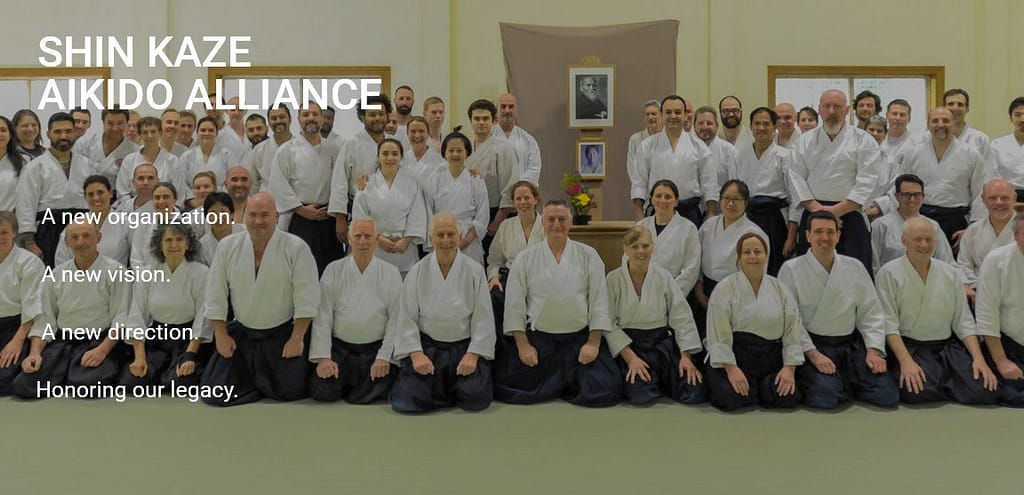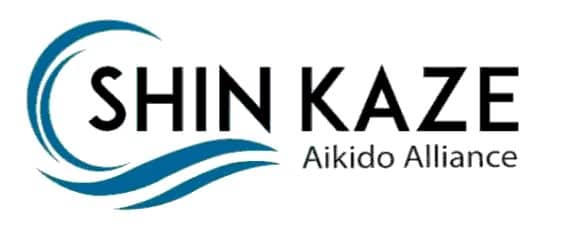
WELCOME !
Shin Kaze aims to provide technical and administrative guidance to Aikido practitioners and to maintain standards of Aikido practice and instruction in a structure that supports cooperative, supportive and mutually beneficial relationships among member dojos.
Shin Kaze Aikido Alliance is an organization officially recognized by Hombu Dojo.

Vision
Shin Kaze’s vision is to be a well-recognized and well-respected international organization that focuses on:
- Technical excellence
- Student and teacher development
- Low-cost structures
- Participatory decision making
- Ethical responsibility
- Equitable leadership representation
- Openness

Values and principles
Shin Kaze’s core guiding values are: Respect, Truthfulness, Compassion, Perseverance, Empathy and Generosity.
These values are the foundation of Shin Kaze’s operating principles: Consultation, Legacy, Education, Equity and Freedom.

Legacy
Shin Kaze aims to:
- Preserve, support and represent the legacies of all primary teachers in our Aikido family tree.
- Create a synergy resulting from interaction among practitioners of the technical and spiritual legacies of these teachers.
- Unite practitioners through shared values, interests and relationships developed through the practice of Aikido as learned through different legacies.

High level instruction
Shin Kaze members have access to a wealth of highly skilled and qualified Aikido instructors, many of whom have trained for decades under the guidance of direct disciples of O-Sensei.

Full participation
Shin Kaze’s organizational structure provides for active input and participation by all its members.

Recognition
Shin Kaze Aikido Alliance is an organization officially recognized by Hombu Dojo, the Aikido World Headquarters in Tokyo, Japan.
All ranks attained through Shin Kaze are registered with Hombu Dojo and recognized world-wide.

FAQs
One of the most distinguishing features of Shin Kaze is that its structure includes two Advisory Committees that interface with the Board and the TC . One committee is composed of dojo-cho, represents the broad Shin Kaze membership and communicates and interacts with the Board. The other committee is composed of senior practitioners and interacts and communicates with the TC. This structure and two-way communication flow allows for the Board, the TC and all levels of membership to actively participate in the organization and to provide and receive quick, relevant, and comprehensive feedback in all significant decision making processes.
Shin Kaze follows the tradition of having a Technical Committee. While at first the TC consists of senior students of Kanai Sensei, Shin Kaze also recognizes and celebrates the teachings and legacies of all the teachers in our branch of the Aikido family tree (N. Tamura Shihan, A. Tohei Shihan, S. Sugano Shihan, K. Chiba Shihan, Y. Yamada Shihan, Y. Kawahara Shihan, Y. Kurita Shihan, I. Shibata Shihan) and others. Shin Kaze envisions the TC will evolve to include representation of all these teachers and their legacies. Shin Kaze’s test requirements are designed to include each of these specific legacies and to adapt to the specific legacy a testing candidate follows.
As Equity is one of the fundamental guiding principles of Shin Kaze, there is an Equity and Access Committee that is responsible for examining any aspect or issue related to these topics. For instance, this includes looking at appropriate measures to ensure equity in practice, recognition and promotion of practitioners from all mis- or under-represented groups. It also includes considering appropriate measures to ensure that financial challenges of practitioners are taken into account when designing seminars, defining costs for promotions, membership fees, etc.
Shin Kaze supports its dojos by consulting with them, by providing them with technical assistance and advice, by leveraging expertise from dojos for the benefit of all members, by providing administrative functions, providing support for business functions and by maintaining fees as low as possible.
Yes. Shin Kaze will recognize and value ranks given by federations recognized by Hombu Dojo.
The Shihan designation will be automatically recognized. The Shidoin and Fukushidoin designations will be recognized to the extent that the holders meet Shin Kaze’s Shidoin and Fukushidoin requirements.
Shin Kaze has two membership categories: individuals, and dojos. Individuals and dojos are considered full members of Shin Kaze when they register and pay membership fees. Shin Kaze also accepts individuals and dojos as associate members. An associate member is an individual or dojo that supports Shin Kaze and either has no membership in another Aikido organization or has membership in another Aikido organization and wishes to test in that organization. Only full members may test in Shin Kaze. If a full member tests outside of Shin Kaze, they automatically become an associate member. Shin Kaze is an inclusive organization and welcomes the membership of someone who also pays fees to another Aikido organization.
Yes. Shin Kaze supports the freedom to define one’s own learning path, for example by allowing dojos to freely invite instructors of their choosing and by members attending Aikido seminars and participating in activities without restriction or penalty. We suggest, however, that students let their chief instructor know in advance, when possible, what seminar or activity they are attending.
Yes. Freedom is a key value of Shin Kaze. Dojos are free to invite whomever they wish.
No. Freedom is a key value of Shin Kaze. Instructors are free to teach seminars without asking permission or fearing reprisals.
Shin Kaze has a process through which important issues arising between its members, including between dojo members and chief instructors and/or dojo-chos, can be examined and resolved. The process strives to maintain clarity, fairness and respect. If necessary, final decisions are made by the Board.
Shin Kaze’s leadership, members and dojos are required to conform to existing legal statutes which prohibit discrimination based on race, color, religion, national origin or sex. Shin Kaze is also committed to providing a practice environment that is free from harassment.
While Shin Kaze provides policies that influence and govern practice environments, and which its leadership, members and dojos are expected and required to abide by, inevitably primary responsibility lies with each dojo.
Shin Kaze will attempt to resolve alleged violations of discrimination and harassment policies and will cooperate fully with legal authorities should it become necessary.

Contact us
We want to hear from you
Address
Shin Kaze Aikido Alliance
58 Ritchie Avenue
Toronto, Ontario
Canada M6R 2J9
Phone
201-702-1416
shinkazeaikidoalliance@gmail.com
